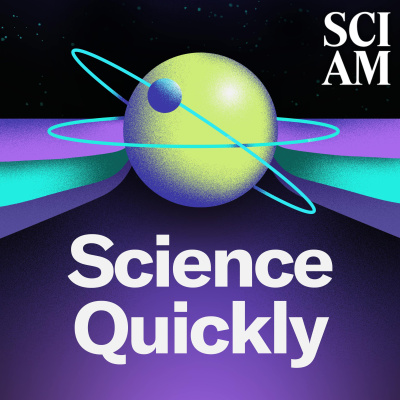Sinopse
Leading science journalists provide a daily minute commentary on some of the most interesting developments in the world of science. For a full-length, weekly podcast you can subscribe to Science Talk: The Podcast of Scientific American . To view all of our archived podcasts please go to www.scientificamerican.com/podcast
Episódios
-
This Artificial Intelligence Learns like a Baby
26/08/2022 Duração: 02minEngineers at the company DeepMind built a machine-learning system based on research on how babies’ brain works, and it did better on certain tasks than its conventional counterparts.
-
Understanding the Inner Workings of Stars [Sponsored]
25/08/2022 Duração: 09minConny Aerts is an astrophysicist and a pioneer of asteroseismology. This year she shared the Kavli Prize in Astrophysics for her research and leadership that has laid the foundations of solar and stellar structure theory, and revolutionized our understanding of the interiors of stars.
-
Dogs Actually Tear Up When Their Owners Come Home
24/08/2022 Duração: 03minOur puppies’ eyes well up, a reaction caused by oxytocin, which makes us want to take care of them even more.
-
A Lifelong Quest to Improve Mental Health among Cancer Patients [Sponsored]
23/08/2022 Duração: 09minRecognizing those who are making a meaningful impact in the lives of cancer patients, the Cancer Community Awards, sponsored by AstraZeneca, presents an individual or organization with the President’s Award. We reconnected with Margaret Stauffer, the 2021 winner, to hear more about what’s happened since she received the award.
-
How Next-Generation Sequencing Can Enable Precision Oncology [Sponsored]
19/08/2022 Duração: 09minCelebrating those who enhance the ability to provide the right treatment for the right patient at the right time, the Cancer Community Awards, sponsored by AstraZeneca, presents an individual or organization with the Catalyst for Precision Medicine Award. We prepared for this year’s awards by reconnecting with the 2021 winner, Dr. Colin Pritchard, to hear more about what’s happened since he received the award.
-
Hawking, a Paradox and a Black Hole Mystery, Solved?
19/08/2022 Duração: 07minWe do not have a theory to tell us everything about how a black hole works, but new research is shedding a least some light on one of their many mysteries.
-
Monkeypox Update and Homing in on Long COVID: COVID, Quickly, Episode 36
16/08/2022 Duração: 10minOn this episode of the COVID, Quickly podcast, we take a few minutes to talk about the other virus making headlines—and then return to long COVID.
-
Fueling Patients' Drive to Treatment [Sponsored]
15/08/2022 Duração: 11minCelebrating those who significantly improve access to cancer care for underserved populations, the Cancer Community Awards, sponsored by AstraZeneca, presents an individual or organization with a Catalyst for Change Award. We spoke with the 2021 award winner, Tomma Hargraves, to learn more about what’s happened since she received the award.
-
Researchers Created a Potion That Turns Loud Lions into Placid Pussycats
12/08/2022 Duração: 06minA single whiff of oxytocin, a chemical that some call the “love hormone,” promotes tolerance among lions at a wildlife sanctuary.
-
Reaching the Root of Disparities in Cancer Care [Sponsored]
10/08/2022 Duração: 07minCelebrating those who strive to overcome disparities in cancer care to bring quality services to their patients, the Cancer Community Awards, sponsored by AstraZeneca, created the Catalyst for Equity Award. We spoke with Dr. Anne Marie Murphy, executive director of Equal Hope and winner of the award in 2021, to learn more about what’s happened since her organization received the award.
-
For Some Dolphins, the Key to Mating is Rolling with a Tight, Noisy Crew
10/08/2022 Duração: 05minA pair of studies show that male bottlenose dolphins rely on wingmen when wooing mates—and that they cultivate these friendships by being vocal.
-
A Source of Integrative Support for Breast and Ovarian Cancer Patients [Sponsored]
03/08/2022 Duração: 10minCelebrating those who are making a patient’s experience as easy as possible during an extraordinarily difficult time, the Cancer Community Awards, sponsored by AstraZeneca, presents an individual or organization with a Catalyst for Care Award. We spoke with the 2021 winner, Unite for HER’s founder and CEO Sue Weldon, to hear more about what’s happened since her organization received the award.
-
How Common Are Reinfections? And How Trust Can Beat the Virus: COVID, Quickly, Episode 35
02/08/2022 Duração: 08minOn this episode of the COVID, Quickly podcast, we talk about getting reinfected with the coronavirus just a month or two after an earlier bout—and the difference that trusting others can make in a pandemic.
-
The Kavli Prize Presents: Understanding Molecules [Sponsored]
29/07/2022 Duração: 10minJacob Sagiv is a chemist who studies properties of self-assembled monolayers. This year, he shared The Kavli Prize in Nanoscience for his research.
-
Transforming the Trajectory of Lung Cancer [Sponsored]
27/07/2022 Duração: 09minLung cancer is the number-one cause of cancer deaths in the world. But how many lives would be saved if doctors could diagnose and treat it before it progresses?
-
Polar Bears That Persist
22/07/2022 Duração: 03minA new subpopulation of Greenland polar bears offers insights into how this species might hang on as Arctic ice disappears.
-
Omicron's Nasty New Variants and Better Boosters to Battle Them: COVID, Quickly, Episode 34
12/07/2022 Duração: 07minOn this episode of the COVID, Quickly podcast, we talk about the increase in new Omicron subvariants. Should fall vaccine boosters contain standard Omicron or some of those new subvariants instead?
-
A Remote-Controlled Carnivorous Plant?
30/06/2022 Duração: 02minResearchers design an artificial neuron that can trigger closure of a Venus flytrap.
-
Kids' Vaccines at Last and Challenges in Making New Drugs: COVID, Quickly, Episode 33
27/06/2022 Duração: 08minOn this episode of the COVID, Quickly podcast, we discuss some parents breathing a collective sigh of relief and the paradox of how effective vaccines can make it harder to create new drugs to treat patients who get the coronavirus.
-
How AI Facial Recognition Is Helping Conserve Pumas
24/06/2022 Duração: 04minResearchers tricked out conventional camera traps to snap headshots of Puma concolor, revealing a better way to track the elusive species.


![Understanding the Inner Workings of Stars [Sponsored]](http://media.ojornalistaapp.com.br/catalog/book-cover-image/176709/200x200/5A2C3A68-2E20-A6A0-09C6-226D167230A0.jpg)

![A Lifelong Quest to Improve Mental Health among Cancer Patients [Sponsored]](http://media.ojornalistaapp.com.br/catalog/book-cover-image/176709/200x200/6D6F407C-E377-0209-487D-2EA145489263.jpg)
![How Next-Generation Sequencing Can Enable Precision Oncology [Sponsored]](http://media.ojornalistaapp.com.br/catalog/book-cover-image/176709/200x200/C76A4FB8-B7E7-29A0-DC93-38167406103D.jpg)


![Fueling Patients Drive to Treatment [Sponsored]](http://media.ojornalistaapp.com.br/catalog/book-cover-image/176709/200x200/56243B99-A8CE-CAA6-9DEB-251163634DC0.jpg)

![Reaching the Root of Disparities in Cancer Care [Sponsored]](http://media.ojornalistaapp.com.br/catalog/book-cover-image/176709/200x200/44979682-FF72-69E8-58F7-3D2FAA2FCA98.jpg)

![A Source of Integrative Support for Breast and Ovarian Cancer Patients [Sponsored]](http://media.ojornalistaapp.com.br/catalog/book-cover-image/176709/200x200/110B448E-7208-D2E5-8DCD-D6764E0AE005.jpg)

![The Kavli Prize Presents: Understanding Molecules [Sponsored]](http://media.ojornalistaapp.com.br/catalog/book-cover-image/176709/200x200/AE85EB76-D2A6-5885-0F63-5156BDE310E7.jpg)
![Transforming the Trajectory of Lung Cancer [Sponsored]](http://media.ojornalistaapp.com.br/catalog/book-cover-image/176709/200x200/55E439D3-AFAB-BA27-C7FD-5CDE878540FA.jpg)














